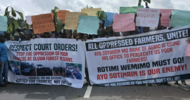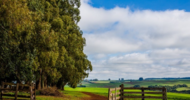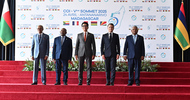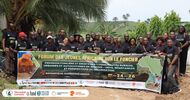Pakistan’s agriculture sector has the potential to cater to the food requirements of the GCC region, which spends over $200 billion on farm imports.
- Pakistan Investment Division & Board of Investment Media Release
-
20 May 2008
‘Feed Indonesia, then feed the world’. Backed by this slogan Indonesia companies, and companies from South Korea, China and Singapore as well, are buying land in the Indonesian province of West Papua in order to grow crops.
- Awas MIfee
-
11 February 2013
A collection of leases for farmland in Sierra Leone in which Kevin Godlington of the UK was involved.
Bloomberg exposé on Frank Timis' plan to turn Les Fermes de la Teranga (ex-Senhuile) into a major source of animal feed for the Gulf States and the implications for Dakar's water supply
- Bloomberg
-
14 November 2023
A six-month investigation by Gideon Sarpong, Elfredah Kevin-Alerechi and Audrey Travère has uncovered the extent to which the relentless exploitation of rubber and palm oil resources by Socfin is fueling deforestation and displacement of indigenous populations in Nigeria and Ghana.
- iWatch Africa
-
06 November 2023
The handful of companies that control industrial palm oil production in West and Central Africa have been linked to numerous social and environmental impacts, violating their buyers’ NDPE commitments.
Miami-based company's investment deal includes the acquisition of farmland and establishment of private farms. Similar deal signed the previous week with Ghana.
- Miami Herald
-
18 July 2013
On the occasion of International Indigenous Peoples Day August 9, Arkilaus Kladit, a member of the Knasaimos-Tehit people in West Papua Province, Indonesia, writes about the importance of his tribe’s customary forests and the fight to protect it from logging and palm oil.
Oil palm, billed as a way to improve local economic opportunity and reduce poverty in the tropics, may not live up to that billing, a recent report shows. On the front lines of oil palm expansion, the indigenous forest-dwelling Arfak people of West Papua Province, Indonesia believe they are not the beneficiaries of the palm’s promise.
As foreign investors descend on Africa to develop large-scale palm oil plantations, the survival of local people is being threatened as they lose control of the land and water on which they depend for their food production and livelihoods
- Pambazuka
-
15 September 2011
"We request the UN Permanent Forum on Indigenous Issues to conduct an independent study on the impact of MIFEE and other similar businesses to Indigenous Peoples in Merauke and around the world."
The European Union is coercing some West African governments into allowing European-based fishing companies to deplete West Africa’s fishing stocks in a new "food colonialism" that is now taking place between rich and poor countries around the world, according to British author George Monbiot.
The Indonesian government is failing to protect the rights of Indigenous peoples who have lost their traditional forests and livelihoods to oil palm plantations in West Kalimantan and Jambi provinces, according to a new report released by Human Rights Watch.
- Human Rights Watch
-
22 September 2019
Homes of chimpanzees destroyed by agribusiness companies – many foreign-owned – who are clearing vast tracts of rainforest throughout west and central Africa to make way for plantations producing palm oil, rubber and other commodities.
- Greenpeace
-
23 February 2015
Indigenous communities, environmentalists and human rights defenders of West Papua gathered in Jayapura, 4-7 November 2014, to discuss problems linked to rapidly expanding plantations.
- Awas Mifee
-
14 November 2014
Africa remains a target for land-grab developments worth billions; regional dialogue in Yaoundé focuses on the need for speed
DekelOil Public Limited, operator and 51% owner of the vertically integrated Ayenouan palm oil project in Côte d'Ivoire, is pleased to announce that it has entered into a contract to develop 10,000 hectares of brownfield land in West Ghana.
The CSOs call for reforms to include a compulsory conflict conciliation procedure and the recognition of customary and legitimate land rights in their diversity.
- Nigeria Tribune
-
04 July 2023
There is no other crop that has grown faster globally in the last decade than palm oil. This almost uncontrollable expansion leaves a deep trail of destruction and conflicts around it. As companies take over more community land, they also grab the water sources from them.
As companies take over more community land, they also grab the water sources from them.
Twenty-seven concessions intended for industrial oil palm plantations in West and Central Africa have either failed or been abandoned in the last decade.
- Mongabay
-
23 September 2019
"AIMI's investment in Farm Lands of Guinea Inc. gives the company and its shareholders exposure to the exciting growth prospects presented by this large-scale agricultural opportunity in West Africa," said Mark Pajak, Acting Chairman of AIM Investments.
- PR Newswire
-
22 August 2011
"Significant" large-scale plantation projects are said to be in development in Indonesia, the Philippines and West Africa.
Liberian, West African and international civil society organizations, communities and individuals are alarmed by news that SRC’s parent company, Socfin, is seeking to divest its shares in SRC without first settling its social, environmental, cultural, financial, and economic debts to affected communities.
Farmers from different communities in the Ondo West Local Government Area of Ondo State took to the streets in protest against the alleged decision of the state government to take over their farmlands for leasing to a Chinese company.
For villagers whose ancestral lands have been lost to the expansive reach of Socapalm’s plantations, the passage of time has failed to bring about the restitution they so desperately seek.
- Pulitzer Center
-
23 August 2023
Some community members accuse Socfin of land-grabbing and pollution. We visited the company’s plantation in Malen to find out what’s happening beneath the palm fronds.
- China Dialogue
-
08 July 2022
Certified by the RSPO in early 2020, Okomu’s motto is “responsible tropical agriculture.” But over the past decade, the company has been embroiled in disputes over land ownership and its use of Nigerian soldiers as a de facto security force for its plantations.
- Mongabay
-
22 November 2021
Big financial institutions rake in profits bankrolling the destruction of the land, homes and livelihoods of communities who have safeguarded their forests for generations
- Global Witness
-
21 October 2021
The Indonesian minister in charge of investments, Luhut Pandjaitan, has declared there will be no new permits for oil palm plantations in the country’s Papua region. Activists are skeptical about the minister’s U-turn, given that Luhut has been the government’s most vocal defender of palm oil industry.
















